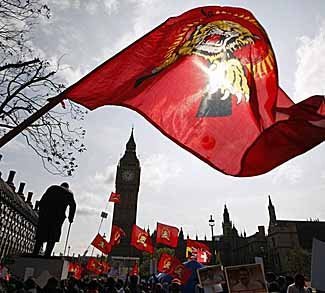



In 1975, after becoming heavily involved in the Tamil movement, he carried out the first major political assassination by a Tamil group, killing Alfred Duraiappah, the mayor of Jaffna, shooting him at point-blank range when he was about to enter the Hindu temple at Ponnaalai. In 1972, he founded the Tamil New Tigers (TNT), a successor to many earlier organizations that protested against the post-colonial political direction of the country, in which the minority Sri Lankan Tamils were pitted against the majority Sinhalese people. Īngered by the discrimination and violent persecution against Tamil people by successive Sri Lankan governments, Prabhakaran joined the student group Tamil Youth Front (TYF) during the standardisation debates. He came from an influential and wealthy family who owned and managed the major Hindu temples in Valvettithurai. Thiruvenkadam Velupillai was the District land Officer in the Ceylon Government. Velupillai Prabhakaran was born in the northern coastal town of Valvettithurai on 26 November 1954, the youngest of four children, to Thiruvenkadam Velupillai and his wife Vallipuram Parvathy. 2.5 Sri Lankan Army Northern offensive and death.Influenced by prominent Indian nationalists Subhas Chandra Bose and Bhagat Singh, who fought the British Empire, Prabhakaran declared that his goal was 'revolutionary socialism and the creation of an egalitarian society'. Prabhakaran argued that he chose military means only after observing that nonviolent means were ineffectual and obsolete, especially after Tamil Eelam revolutionary Thileepan's fatal hunger strike in 1987 had no effect. Ī significant figure of Sri Lankan Tamil nationalism, Prabhakaran is often seen as a martyr by Sri Lankan Tamils, but critics have noted that he created one of the most notorious and sophisticated insurgencies, with many of the tactics he pioneered influencing political militant groups globally. Our only regrets are for the lives lost and that we could not hold out for longer" by Selvarasa Pathmanathan, the Tigers' chief of international relations, brought an end to the armed conflict. Prabhakaran's reported death and the announcement "We have decided to silence our guns. His 12-year-old second son was executed a short time later. His son Charles Anthony was also killed in fighting with the Sri Lankan Army, and his wife's and daughter's bodies were reportedly found by the Sri Lankan army the Sri Lankan government later denied the report. Prabhakaran, who had said, “I would prefer to die in honour rather than being caught alive by the enemy”, was killed in fighting with the Sri Lankan Army in May 2009. Peace talks eventually broke down, and the Sri Lanka Army launched a military campaign to defeat the LTTE in 2006. By then, the LTTE, which came to be known as the Tamil Tigers, controlled large swathes of land in the north and east of the country, running a de facto state with Prabhakaran as its leader. After years of fighting, including the intervention of the Indian Army ( IPKF), the conflict was halted after international mediation in 2001. This ambush, along with the subsequent pogrom that resulted in the deaths of thousands of Tamil civilians, is generally considered the start of the Sri Lankan Civil War. įounded in 1976, the LTTE rocketed to prominence in 1983 after it ambushed a patrol of the Sri Lanka Army outside Jaffna, resulting in the deaths of 13 soldiers. Considered the heart of Tamil culture and literature in Sri Lanka, Jaffna was concentrated with growing Tamil nationalism, which called for autonomy for Tamils to protest the discrimination against them by the Sinhalese-dominated Sri Lanka government and Sinhalese civilians since Sri Lanka gained independence from Britain in 1948. Prabhakaran was the youngest of four children, born in Valvettithurai, on Sri Lanka's Jaffna peninsula's northern coast. The LTTE waged war in Sri Lanka for more than 25 years, to create an independent state for the Sri Lankan Tamil people. Velupillai Prabhakaran ( listen (US English) Tamil: வேலுப்பிள்ளை பிரபாகரன் Tamil pronunciation:, 26 November 1954 – 18 May 2009) was a Sri Lankan Tamil guerrilla and the founder and leader of the Liberation Tigers of Tamil Eelam (LTTE), a militant organization that sought to create an independent Tamil state in the north and east of Sri Lanka.


 0 kommentar(er)
0 kommentar(er)
